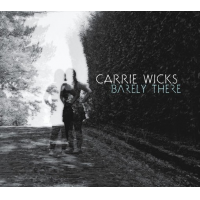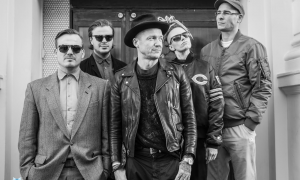Home » Jazz Articles » Live Review » Anat Cohen at Kennedy Center Jazz Club
Anat Cohen at Kennedy Center Jazz Club
Featuring works from her latest release, Claroscuro (Anzic, 2012), Cohen's performance was no less superb than previous outings, compelling both for the musical intensity the quartet brought to the stage and Cohen's irrepressible persona which seems to transform every venue large or small into a bohemian enclave of free-spirited bonhomme. It is rare, for example, for a performer at the KC Club to simply sit down in the middle of the stage while her band mates solo, swaying to the music with eyes closed in much the way one imagines might occur during a private moment of rehearsal. In fact, the entire band projected a similar natural ease creating a sense of invitation into the personal space of their musical intimacy.
Heralding the multicultural bent to the night, Cohen opened with the Brazilian tune "Tudo Que Voce Podia Ser," which she loosely translated as "Everything You Could Be Without Fear." An appropriate beginning to the show, the piece's jaunty rhythm and catchy melody are easy to like and provided a platform for Cohen and pianist Jason Lindner to build inventive solos that played with expectations nicely. Lindner and Cohen then transferred to tambourine and a small drum to end the tune on a rhythmic high point.
Cohen then switched to clarinet to deliver a more far-reaching version of "Siboney" from her album Notes from the Village (Anzic, 2008). Starting with a middle eastern-tinged piano opening from Lindner, the tune mixed musical lineages as it twisted in an unpredictable swirl of notes and rhythmic changes as if navigating a clown-color painted maze. Introducing the subsequent "And the World Weeps," by pioneer organist Dr. Lonnie Smith (who recently performed at the KC Club as well), Cohen described Smith as an inspiration who "transfers you to another sphere of being." Founded on a plodding rhythm beat out on bass and a single piano note, the band established an almost cartoonishly dark, Carpathian mood before letting loose with extended, searching solos of great intensity that did indeed transfer into alternative spheres. The highlight of a powerful evening, the tune emphatically revealed the deep musical relationship between Cohen and Lindner. A matched pair of musical sensualists, the two clearly inspires each other into new realms of inventiveness, humor, and passionate exploration.
After a bass-centered excursion, "J Blues," written for Lindner and on which drummer Daniel Freedman's cymbal playing shone, the band took the unusual step of closing the set with a ballad, in this case "As Rosas Nao Falam," once again tapping the Latin tradition. A painfully well-executed piece, Cohen etched a strangely vibrant portrait of contrasting emotions concocted of effervescent longing.
Cohen does not use her clarinet to play notes. She employs it to create spiritual worlds defined by contrasting colors, light, and emotional texture. She taps a vast musical knowledge spanning many cultures and genres in order to accomplish this feat, but the most fascinating element is that whether playing an original, a jazz standard, or pulling from other sources, the result invariably sounds as if it is welling forth from Cohen's very fiber, a natural extension of who she is. It is also worth emphasizing that so much focus is drawn to Cohen and her virtuoso skills that it is tempting to overlook the contributions of her musical partners. The inventiveness, savvy, and shared vision of Lindner, bassist Joe Martin, and Freedman were essential to crafting the engrossing musical experience witnessed at the Kennedy Center.
Tags
Anat Cohen
Live Reviews
Franz A. Matzner
United States
District Of Columbia
Washington
jason moran
Jason Lindner
Dr. Lonnie Smith
Daniel Freedman
Joe Martin
PREVIOUS / NEXT
Anat Cohen Concerts
Support All About Jazz
 All About Jazz has been a pillar of jazz since 1995, championing it as an art form and, more importantly, supporting the musicians who make it. Our enduring commitment has made "AAJ" one of the most culturally important websites of its kind, read by hundreds of thousands of fans, musicians and industry figures every month.
All About Jazz has been a pillar of jazz since 1995, championing it as an art form and, more importantly, supporting the musicians who make it. Our enduring commitment has made "AAJ" one of the most culturally important websites of its kind, read by hundreds of thousands of fans, musicians and industry figures every month.

























